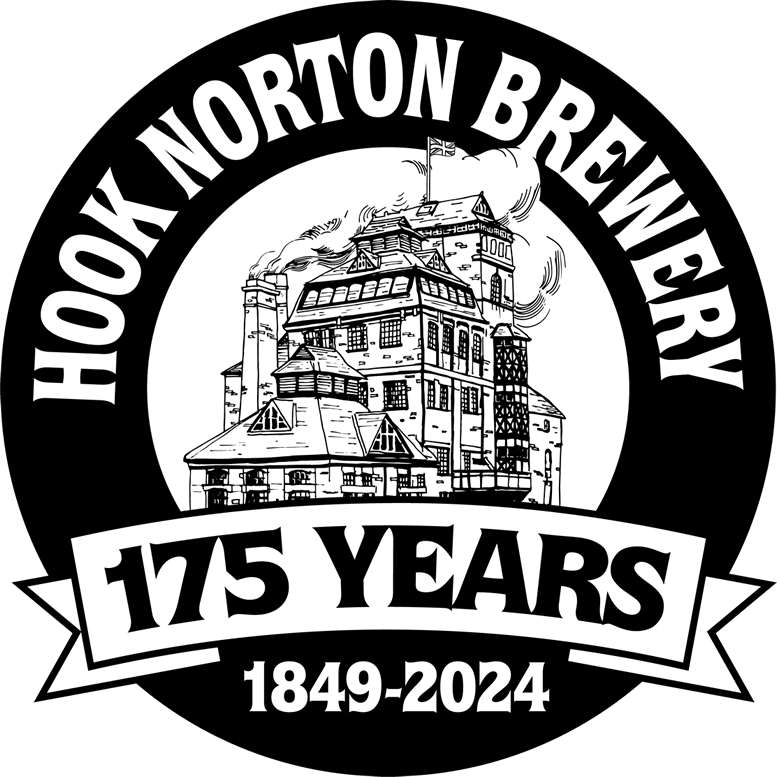
THE OXFORD DRINKER
Brewery Focus: Hook Norton
Dave Richardson reports on one of the oldest names still brewing, and how innovations are carrying it forward
Tradition is a word which, you might think, describes everything that Hook Norton Brewery does. It is still brewing today on the same site where it started over 160 years ago, and it still has a working steam engine to supply power and a stud of shire horses that can be seen pulling drays. It doesn’t matter that the steam engine is only fired up occasionally or that most of the beer is delivered by lorry – what matters is that “Hooky”, as it’s often known, respects and builds on its heritage.
Situated in a north Oxfordshire village of the same name between Chipping Norton and Banbury, the brewery faces an increasing number of competitors keen to capitalise on the public’s thirst for craft ales be they cask, keg, bottled or canned. But tradition only gets you so far, and in the last couple of years Hook Norton has started producing keg beers as well as a range of limited production beers using its own micro-brewery within the original building.
Hook Norton’s take-over of the Castle Tavern in Oxford at the end of last year was a welcome development, meaning a guaranteed outlet for its beers in the city for the first time. When it re-opens in May, a few months before the much expanded Westgate Centre opens just across the road, you’ll be able to sample up to eight real ales and other craft beers not only from this brewery, but local guest ales too.
The story began in 1849 when John Harris bought a farm in Hook Norton that included a Malthouse. Brewing started in 1856 with the first pub being acquired three years later. The Pear Tree Inn, close to the brewery, was acquired in 1869 and the brewery expanded rapidly at the end of the 19th century. The brewery stands on the site of the original farm and is thought to be finest surviving example of a Victorian tower brewery. The very simple (and ecologically sound) principle behind a tower brewery is that all the ingredients are either carried or pumped to the top, and come down by gravity.
Another link with tradition is that Hook Norton has been in the same family throughout its existence – no mean feat when it’s had to weather periods of huge upheaval in the brewing industry. Many family firms were taken over, often by asset stripping giants who then closed them down, while sometimes continuing to brew beers with the original name. Hook Norton’s managing director James Clarke joined at the age of 20 in 1991, and is the great-great-grandson of the founder, Alban Clarke being a nephew of John Harris. Some of James’s four sons have already worked at the brewery, so a sixth generation of the family might one day take over.
To visit the brewery today – as over 20,000 a year do on brewery tours operating daily except Sundays (£14.50/£12 over-60s) – is to not only soak up tradition and of course a few beers, but to see a business with a modern outlook and strong branding too. The visitor centre and shop in the old maltings is being expanded, with a second bar in the cellar now available for functions, and plans for a restaurant. The museum on the upper floor covers the village generally as well as the brewery.
Tours cover each floor of the adjacent tower, and also visit the shire horses in their stable. The horses usually deliver to village pubs on Thursdays and Fridays, and also attend special events by arrangement.
The micro-brewery on the ground floor of the tower is a self-contained space where all kinds of “crafty” brews (limited to 20 72-pint firkin barrels) can be tried out, and this is where “brew your own beer” days are held at a cost of £500 per party. These days are proving popular prior to weddings (about three weeks before the event) and include a personalised pump clip and two firkins of beer to take away.
Traditionalist real ale drinkers needn’t worry about the new developments, as about 80% of output is still cask ale, with Hooky bitter (3.5%) and Old Hooky (4.6%) being the best-known brands, brewed entirely with British hops. Hooky Mild is still produced at a flavoursome 2.8% — a very low ABV by today’s standards – but the fourth core real ale has changed. The copper ale Lion is no longer part of the core range but will appear as a special – the new core ale is Hooky Gold at 4.1%.
“We started brewing Gold as a seasonal ale back in May last year, but demand has been so great that we have been brewing it ever since,” says marketing manager Mark Graham. “We are still brewing Mild and about a third of the nearly 40 pubs in our estate take it on, but not many pubs take Mild for free trade sales.
“We are now producing a seasonal ale every month, and with our micro-brewery we can try all sorts of ingredients to respond to changing tastes. We might do a Black IPA or a honey beer, for example.”
Kegging equipment – injecting carbon dioxide into beer to give it a gassy taste and longer shelf life – was installed about two years ago, and three so-called craft kegs are now part of the core range, these being Red Rye (4.7%), Cotswold Pale (4.4%) and Merula Stout (4.2%). Craft kegs are a rapidly growing market that few brewers can afford to ignore, being especially popular among younger drinkers.
“Cask and keg ales will be available in the Castle in Oxford, but it won’t be a weird and wonderful bar like some of the new ones that have opened there,” says Mark.
“With about 1,500 breweries operating in Britain we certainly face a lot of competition, but about 200 of them are probably one-man-in-a-shed operations and the quality can vary greatly from brew to brew. But we do expect the growth in breweries to plateau, and some large pub companies have indicated they will no longer deal with breweries that haven’t been through an independent auditing process.”
Micro-breweries do, however, enjoy significant tax breaks that put small to medium-sized breweries such as Hook Norton at a disadvantage, squeezed between the micros on one hand and the giants on the other. But Mark says Hook Norton is not chasing volume sales, and is deriving significant revenue through its shop, tours, special events and business meetings, which can be held either in its cellar bar or boardroom.
“We’re keen to make the brewery more of a destination in its own right,” he explains. “We may do pop-up pubs to lift the brand, and are always looking for opportunities to develop our pub estate. We will do about 50 outside events this year, from farmers’ markets to the Cornbury music festival, and we also did Countryside Live at Blenheim Palace. There’s definitely an appetite for real ale at festivals – to have a pub experience in the middle of a field.
“Because we’ve been around for so long, that is not a reason for people to buy your product. We are always looking to do things a bit differently – tradition, but with a modern twist.”
To read more about Hook Norton’s heritage or to book a brewery tour, visit www.hooky.co.uk
The Castle Tavern in Oxford is expected to re-open by the beginning of May.
To read the full Oxford Drinker please click here


